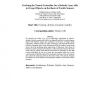Free Online Productivity Tools
i2Speak
i2Symbol
i2OCR
iTex2Img
iWeb2Print
iWeb2Shot
i2Type
iPdf2Split
iPdf2Merge
i2Bopomofo
i2Arabic
i2Style
i2Image
i2PDF
iLatex2Rtf
Sci2ools
AIIA
2003
Springer
2003
Springer
Evolving the Neural Controller for a Robotic Arm Able to Grasp Objects on the Basis of Tactile Sensors
We describe the results of a set of evolutionary experiments in which a simulated robotic arm provided with a two-fingered hand has to reach and grasp objects with different shapes and orientations on the basis of simple tactile information. Obtained results are rather encouraging and demonstrate that the problem of grasping objects with characteristics that vary within a certain range can be solved by producing rather simple forms of behaviour. These forms of behaviour exploit emergent characteristics of the interaction between the body of the robot, its control system and the environment. In particular we show that evolved individuals do not try to keep the environment stable but on the contrary push and pull the objects thus producing a dynamic in the environment and exploit the interaction between the body of the robot and the dynamic environment to master different environmental conditions with similar control strategies.
AIIA 2003 | Artificial Intelligence | Exploit Emergent Characteristics | Simple Tactile Information | Simulated Robotic Arm |
| Added | 06 Jul 2010 |
| Updated | 06 Jul 2010 |
| Type | Conference |
| Year | 2003 |
| Where | AIIA |
| Authors | Raffaele Bianco, Stefano Nolfi |
Comments (0)

